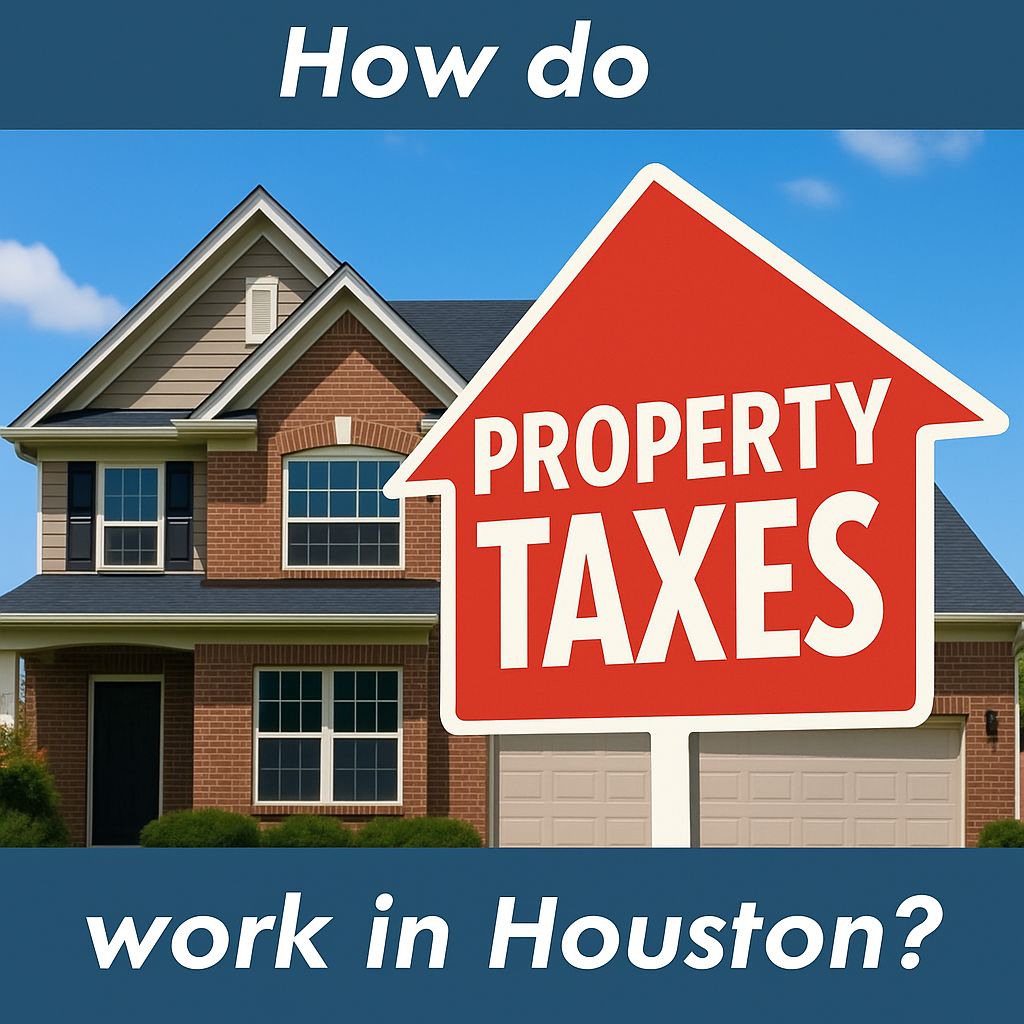In the Greater Houston Area, your property tax bill is based on your home’s appraised value and the combined tax rates from city, county, school, and special districts (such as Municipal Utility Districts (MUDs)). Texas doesn’t have a state income tax, so local property taxes fund most city and county services, making them a key part of your total housing cost. The good news: homestead and other exemptions can lower your taxable value and help reduce your bill.
How Property Taxes Are Calculated in Greater Houston (Including Exemptions)
Every homeowner in Texas pays property taxes, but how much you pay depends on where you buy and which taxing authorities apply. Here’s how it works:
- Appraised Value
Each county’s appraisal district, such as the Harris Central Appraisal District (HCAD), the Fort Bend Central Appraisal District (FBCAD), and the Montgomery Central Appraisal District (MCAD) > determines your home’s market value each January 1. That value becomes the base for your annual tax bill.
- Texas Is a Non-Disclosure State
Texas doesn’t require the disclosure of sale prices, so county appraisers rely on indirect data and market models. Because of that, homeowners should review and, when appropriate, appeal their assessed value to make sure it’s accurate.
- Combined Tax Rates (Per $100 of Value)
Each taxing unit (city, county, school district, and MUD) applies its own rate. These rates are combined into a single annual rate that typically ranges from 2.4% to 3.2% across Greater Houston.
Typical examples (as of 2025):
- City of Houston Tax Rate: approximately $0.52 per $100
- Harris County Tax Office: approximately $0.38 per $100
- Houston ISD Property Tax: approximately $0.87 per $100
- MUDs: vary widely depending on development stage
🔎 Always verify the exact rate for a specific property through your local appraisal district’s search tool.
- Example: Property Tax Calculation
If your home is valued at $350,000 and your total rate is 2.8%, your annual property tax would be about $9,800 per year (or roughly $817 per month) added to your mortgage escrow. This amount can vary depending on exemptions or MUD assessments.
Property Tax Exemptions Every Homeowner Should Know
Texas offers several exemptions that can meaningfully reduce your taxable value and your tax bill.
Homestead Exemption
Reduces the taxable value of your primary residence. Following voter approval in the November 2025 election,Proposition 13 raised the statewide school tax exemption from $100,000 to $140,000. This increased exemption applies retroactively to the 2025 tax year.
You can apply directly through HCAD’s Homestead Exemption page
Over-65 or Disabled Exemption
Provides additional reductions for eligible homeowners and freezes the school district portion of your taxes, limiting future increases. Following voter approval of Proposition 11 in November 2025, the additional school-district exemption for this group increased from $10,000 to $60,000.
Veterans Exemption
Qualified disabled veterans can receive partial or full exemptions depending on their VA disability rating.
How to Apply
Apply with your county appraisal district between January 1 and April 30 of the tax year:
- Harris County Appraisal District (HCAD)
- Fort Bend Central Appraisal District (FBCAD)
- Montgomery Central Appraisal District (MCAD)
You’ll need:
- A valid Texas Driver’s License or ID showing the homestead address
- Proof of ownership (such as your deed)
Once approved, your exemption remains active as long as the home is your primary residence.
How Property Taxes Affect Your Monthly Mortgage Payment
Most lenders collect property taxes through an escrow account, so your monthly mortgage payment includes:
- Principal and interest
- Homeowner’s insurance
- Property taxes (1/12 of your annual amount)
If your annual property tax is $9,800, that adds about $817 per month to your escrow. Because rates vary by area, always confirm the combined tax rate before writing an offer.
Comparing Property Tax Rates Across Houston Suburbs (and MUDs)
Many suburban areas such as Katy,Bridgeland/Towne Lake, and The Woodlands include Municipal Utility Districts (MUDs) that fund infrastructure like water, sewer, and drainage.
- Early years: MUD taxes are highest while bonds are being repaid.
- Later years: Rates decline as debt is paid off, often over 20–30 years.
- Buyer tip: Ask for the property’s current combined tax rate, including any MUD, before you buy.
Appealing Your Property Value
If your appraised value seems too high:
- Review your Notice of Appraised Value (mailed each spring).
- File a protest within 30 days of receiving it.
- Provide supporting evidence such as comparable sales or repair estimates.
Even modest reductions can save you hundreds each year. Visit the HCAD Protests & Corrections page to file or track your protest online.
Buyer Tips and Resources
Before buying, make sure you:
- Verify the exact combined tax rate for the property (city/county/school/MUD).
- Estimate escrow costs using last year’s bill or a sample rate.
- Apply for exemptions right after closing.
- Research MUDs and utility districts to understand long-term costs.
- Budget for increases as property values often rise even when rates stay flat.
- Use official district sites: HCAD.org, FBCAD.org, MCAD-TX.org.
For broader context, visit the Texas Comptroller’s Property Tax Overview and Exemptions Guide.
Final Takeaway
In Greater Houston, property taxes are central to affordability. By checking the combined rate, claiming your exemptions, and appealing inaccurate valuations, you’ll avoid surprises and make confident buying decisions.
Texas’ non-disclosure status makes understanding your local appraisal process essential — and the right guidance can help you protect your budget from year one.
Schedule a Consultation
Want a personalized estimate of property taxes for homes you’re considering — or need help comparing rates across Harris, Fort Bend, and Montgomery counties?
👉 Schedule a consultation with The Moore Real Estate Group. We’ll help you review tax rates by neighborhood, identify available exemptions, and plan your purchase with clarity and confidence.
